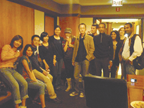On Being a Fresh Grad
This column is written for statisticians with master’s degrees and highlights areas of employment that will benefit statisticians at the master’s level. Comments and suggestions should be sent to Keith Crank, the ASA’s research and graduate education manager, at keith@amstat.org.
Contributing Editor
Andrea Barbo is a research associate at Georgetown University Department of Oncology. Her interests are statistical programming and data analysis in cancer research.
It has been nine months, but it seems like only yesterday when my classmates and I presented in a poster session as the culmination of a year’s work for our master’s in biostatistics program. I can still recall the strong sense of fulfillment (and relief) I felt for having completed and achieved something. I was both excited and anxious of what was in store for a fresh graduate like me.
It also seems like only yesterday when I was in full job-hunting mode—the countless modifications to my résumé and cover letters, networking with professors, and filling out online job applications. I knew I had to have an impressive résumé and be resourceful and patient to land a job I really liked in a field I was interested in—cancer research. Relying on my previous work experience and good recommendations from professors, I was fortunate enough to land a job two months after graduating.
I have been working as a research associate in Georgetown University Medical Center for seven months now. I have been part of an interdisciplinary team that provides informatics support for two huge cancer family registries established by the National Cancer Institute. Being new to a large, multi-center project was definitely challenging, as I had to quickly learn and understand the database to be able to generate quality reports and help improve data quality. It felt very rewarding, though, knowing the team’s efforts play a role in the conduct of invaluable genetic and molecular epidemiologic research by investigators all over the world.
I have heard and read about how biostatistics is such an employable field and a rewarding career to pursue. I could say that my experience as a fresh grad was enriching and my first job post-master’s has made me realize even more that grad school was a good idea. I am happy to know my former classmates feel the same way:

From Left: Yi-Ting Tsai, Andrea Barbo, Jui-Fu Huang, Su Qi, Ping Li, Beibei Yu, Yixiao Gong, Thomas McAndrew, Adane Fedaku, Deepti Reddy, Beth Elston, and Eshetu Tefera
Beth Elston, Providence, Rhode Island
I am a data analyst for a reproductive epidemiologist. So far, I am thoroughly enjoying my job, especially the analysis, less so the data management. My master’s in biostatistics was a good foundational start for this job. However, there’s been an extraordinary amount of on-the-job learning. I continue to learn about concepts we touched on in school, and I am learning and applying brand new concepts. This is what I was expecting as a new graduate.
I started job hunting with about two months left in my master’s program. I mostly searched online and submitted many, many résumés. As time progressed, I kept broadening my search geographically. Around a month into the search, I started to hear back from prospective employers. My current position provided the best fit for what I was looking for in regard to job tasks and quality of life. I think the most helpful thing for me was to have experience in a variety of aspects of health research, especially data collection and entry, prior to beginning the program. This provided me perspective on other people’s roles (and headaches).
Tom McAndrew, Bronx, New York
I’m a biostatistician for Albert Einstein College of Medicine (AECOM). I work for AECOM, Montefiore Medical Center, and Jacoby Medical Center on HPV genetics and cervical cancer research. My job is rewarding. I’d like to continue my education soon. My master’s gave me the base knowledge that I can expand on in an ever-changing analysis environment. I chose to pursue higher education because I love learning. My job hunt took 1.5 to 2.5 months. I found this job online.
Su Qi, Baltimore, Maryland
I am a bioinformatics analyst. Work is going really well; coworkers are willing to help and teach a lot. Having a master’s in biostatistics gave me a strong foundation to go further into the human genetics field. I decided to pursue biostatistics because I wanted to go into a field in which I can apply both my biology and statistics knowledge. The job-hunting process for me took more than four months. My advice to those interested in a career in biostatistics is to find an area you are really interested in and build a strong knowledge foundation.



















Thank you for this article! I want to see more articles like this one as job hunting can be so stressful.